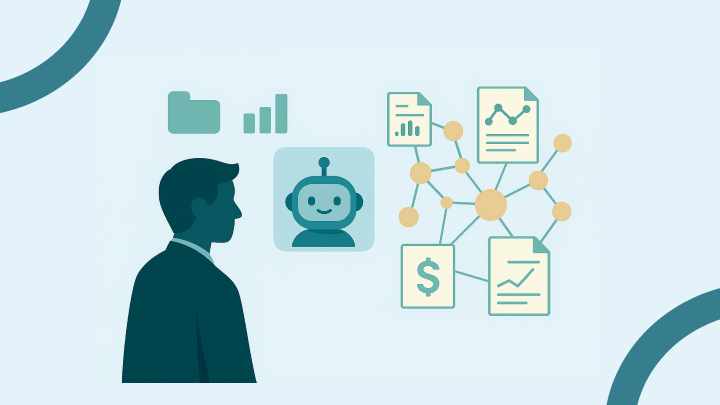

OpenAI-Style Connectors: The Surface Layer
Most LLM connectors only skim data. They index metadata such as file names, authors, or snippets. When a query matches, they fetch the document at that moment. It is like having a phone directory: you can get the number, but until you call, you do not know what’s inside or how items relate.
Needl.ai: Deep Data Intelligence
Needl.ai does the work up front. Every file is deeply indexed at a granular level. The platform parses full content and builds a knowledge graph that maps relationships across investor decks, credit memos, market data, internal emails, and compliance logs. It is like having a senior researcher who has already read, understood, and catalogued everything.
This also responds to a common investor concern: How do we ensure an AI assistant understands context instead of giving shallow answers? The answer lies in deep indexing and knowledge graphs which capture relationships and meaning across documents rather than retrieving isolated snippets.
1. True On-Premises Security
Needl.ai runs inside your VPC or on-premises environment, aligned with SOC 2 and ISO 27001 controls. Security and compliance remain top of mind in financial services. According to PwC’s Global Compliance Study 2025, 89% of executives are concerned about data privacy and security when using AI in compliance activities (PwC).
2. Unified Intelligence Across All Data Types
Needl.ai breaks down silos between structured and unstructured data. Fund performance spreadsheets, investment memos, regulatory filings, earnings call transcripts, and side letters can all be processed together.
Example queries answered instantly include:
3. Simultaneous Internal and External Intelligence
Needl.ai merges proprietary knowledge with external signals such as market conditions, sanctions, and credit-rating changes to deliver context-aware insights. For example, firms can ask: “Which of our holdings are directly impacted by the latest SEC proposal?” or “Which potential buyout targets received new environmental fines last quarter?”
4. Cloud and LLM Provider Agnostic
Firms choose their cloud (AWS, Azure, Google, hybrid, or on-premises) and their models (GPT, Claude, Llama, or proprietary). This ensures flexibility and control. Multi-cloud adoption is already strong. A recent industry survey found that 57% of financial services organizations use multiple cloud providers to meet resilience, compliance, and agility needs (BizTech Magazine).
5. Customizable Knowledge Workflows
Needl.ai mirrors actual workflows inside financial firms. Deal-team reviews, investment-committee approvals, and compliance sign-offs can be embedded, making the system feel like part of the team rather than a generic chatbot.
• Faster portfolio monitoring: Risk teams cut tracking time by more than half with automated alerts on downgrades and regulatory changes.
• Better deal sourcing: Deal teams move from weeks of manual screening to days, while surfacing higher-quality opportunities.
• Quicker investor reporting: Quarterly reports that once took days are now prepared in minutes by combining data from different sources.
McKinsey estimates that AI, generative AI, and agentic AI together could reshape the economics of asset management by reducing costs equivalent to 25-40% of the average firm’s cost base (McKinsey).
Needl.ai customers in asset management and private equity consistently report:
• Time-to-insight reduced from days to minutes
• Decision quality improved through cross-source correlation
• Stronger compliance and risk posture under SOC 2 and ISO 27001
• Faster innovation in research and deal evaluation
The World Economic Forum notes that financial services firms globally spent about US$35 billion on AI in 2023, a figure projected to grow rapidly in the years ahead (World Economic Forum). This shows that AI is no longer an experiment but a core line item in the industry’s technology strategy.
The question is not whether AI will transform how firms use their knowledge assets. It is whether they will choose solutions that truly understand their data or merely connect to it.
While connectors provide basic access, deep indexing platforms like Needl.ai create genuine intelligence from information assets. In a sector where knowledge is the ultimate competitive advantage, the depth of an AI platform’s understanding may well determine a firm’s trajectory.
Your firm deserves more than just another connector. It deserves a knowledge partner that truly understands your business from the inside out.
Which firms in BFSI benefit most from deep AI platforms?
Asset managers, hedge funds, private equity firms, and investment banks benefit the most because they handle large volumes of sensitive and interconnected data.
How can firms ensure security and compliance when using AI?
Choose platforms that run within your secure environment, meet standards such as SOC 2 and ISO 27001, and provide transparency over data handling.
Why are generic connectors insufficient for BFSI?
They index only metadata and fetch files at query time. This misses the context between documents. Deep indexing platforms instead connect meaning across information assets.